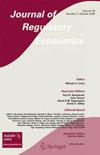影响因子:
1.4
ISSN:
print: 0922-680X
on-line: 1573-0468
on-line: 1573-0468
研究领域:
ECONOMICS
自引率:
0.00%
Gold OA文章占比:
22.22%
原创研究文献占比:
100.00%
SCI收录类型:
Social Science Citation Index (SSCI) || Scopus (CiteScore)
期刊介绍英文:
Recent legislative and policy reforms have changed the nature of regulation. Partial deregulation has created a new dimension to regulatory problems, as the debate is extended to include diversification and new forms of regulation. The introduction of incentive-based rate schedules and ratemaking procedures, the integration of demand-side programs with planning for capitol expansion, and other developments, raise a host of theoretical and empirical questions. The Journal of Regulatory Economics serves as a high quality forum for the analysis of regulatory theories and institutions by developing the rigorous economics foundations of regulation. Both theoretical and applied works, including experimental research, are encouraged. Research in all aspects of regulation is of interest including traditional problems of natural monopoly, antitrust and competition policy, incentive regulation, deregulation, auction theory, new policy instruments, health and safety regulation, environmental regulation, insurance and financial regulation, hazardous and solid waste regulation, universal service obligation, and consumer product regulation. The JRE provides researchers, policy-makers, and institutions with current perspectives on the theory and practice of economics of regulation. While there are a number of journals and magazines that include the study of regulation, the JRE is unique in that it fills a gap in the market for a high quality journal dealing solely with the economics of regulation.Officially cited as: J Regul Econ
CiteScore:
| CiteScore | SJR | SNIP | CiteScore排名 |
|---|---|---|---|
| 2.4 | 0.464 | 0.716 | 学科 排名 百分位 大类:Economics, Econometrics and Finance 小类:Economics and Econometrics 369 / 716 48% |
发文信息
中科院SCI期刊分区
2025年3月20日发布
| 大类 | 小类 | TOP期刊 | 综述期刊 |
|---|---|---|---|
| 4区 经济学 | 4区 经济学 ECONOMICS | 否 | 否 |
2023年12月发布
| 大类 | 小类 | TOP期刊 | 综述期刊 |
|---|---|---|---|
| 4区 经济学 |
4区
经济学
ECONOMICS
|
否 | 否 |
WOS期刊分区
| 学科分类 |
|---|
Q3ECONOMICS |
历年影响因子
| 2021年 | 1.5530 |
|---|---|
| 2022年 | 1.1000 |
| 2023年 | 1.4000 |
| 2024年 | 1.4000 |
历年发表
| 2012年 | 36 |
|---|---|
| 2013年 | 31 |
| 2014年 | 31 |
| 2015年 | 23 |
| 2016年 | 24 |
| 2017年 | 35 |
| 2018年 | 25 |
| 2019年 | 25 |
| 2020年 | 23 |
| 2021年 | 20 |
| 2022年 | 14 |
投稿信息
出版周期:
6 issues per year
出版国家(地区):
Netherlands
初审时长:
8 days
出版商:
Springer Nature
Journal of Regulatory Economics - 最新文献
Rules for the rulemakers: asymmetric information and the political economy of benefit-cost analysis
Pub Date : 2024-07-24 DOI: 10.1007/s11149-024-09483-4 David Besanko, Avner A. Kreps, Clair YangCompetitive effects of implicit auction on interconnectors: evidence from Japan
Pub Date : 2024-05-29 DOI: 10.1007/s11149-024-09476-3 Kota SugimotoNatural monopoly revisited
Pub Date : 2024-05-18 DOI: 10.1007/s11149-024-09479-0 Oriol Carbonell-Nicolau
免责声明:
本页显示期刊或杂志信息,仅供参考学习,不是任何期刊杂志官网,不涉及出版事务,特此申明。如需出版一切事务需要用户自己向出版商联系核实。若本页展示内容有任何问题,请联系我们,邮箱:info@booksci.cn,我们会认真核实处理。
本页显示期刊或杂志信息,仅供参考学习,不是任何期刊杂志官网,不涉及出版事务,特此申明。如需出版一切事务需要用户自己向出版商联系核实。若本页展示内容有任何问题,请联系我们,邮箱:info@booksci.cn,我们会认真核实处理。






